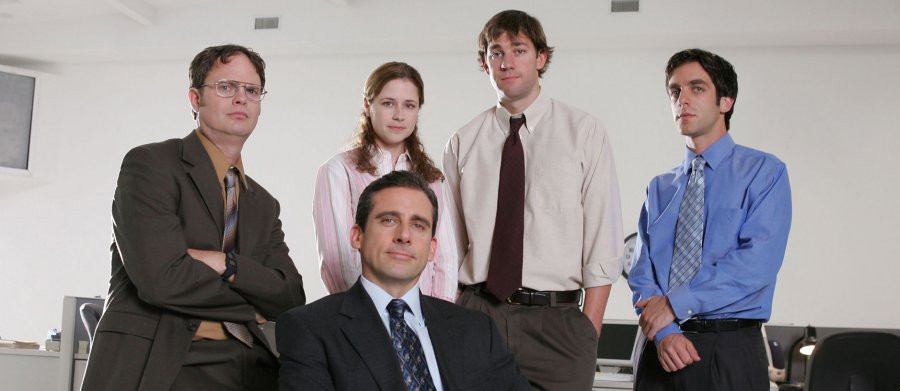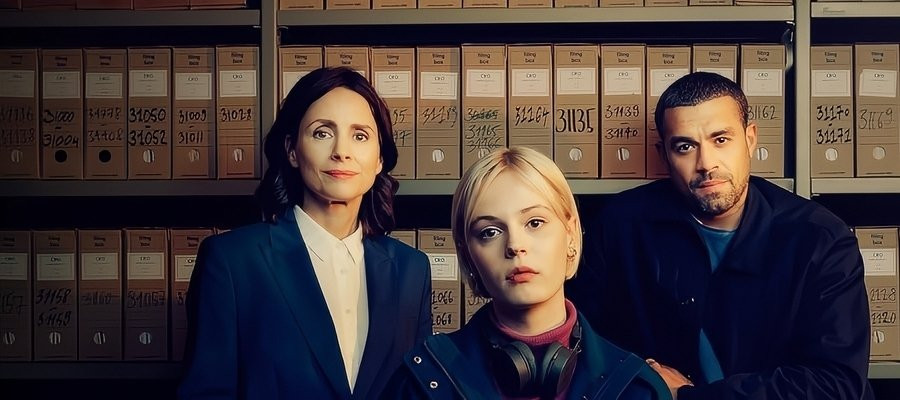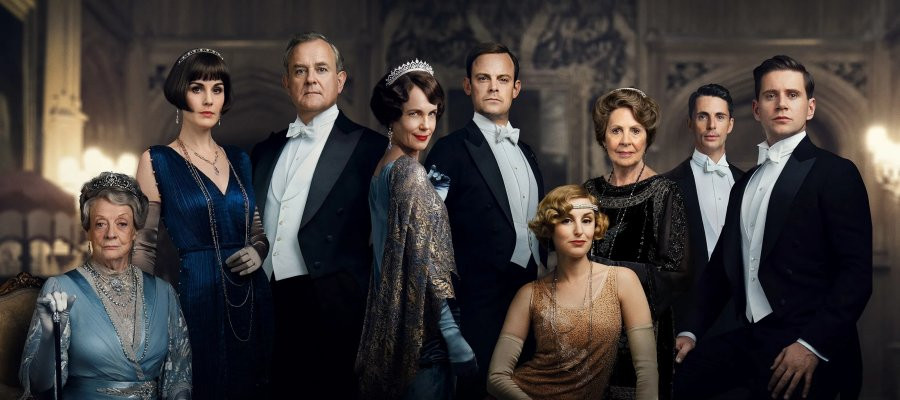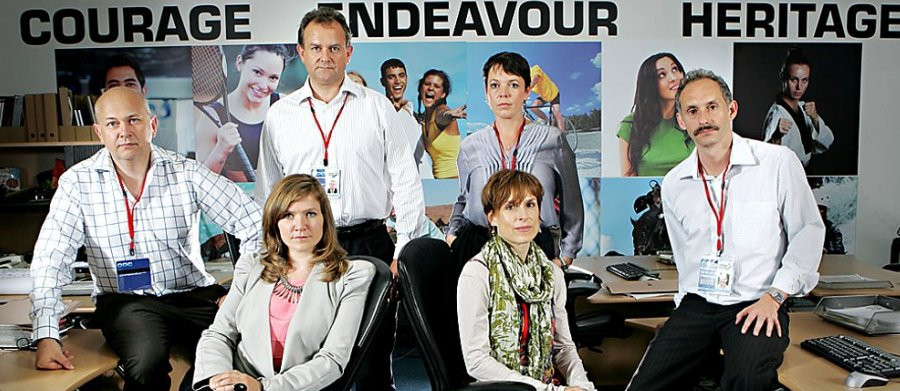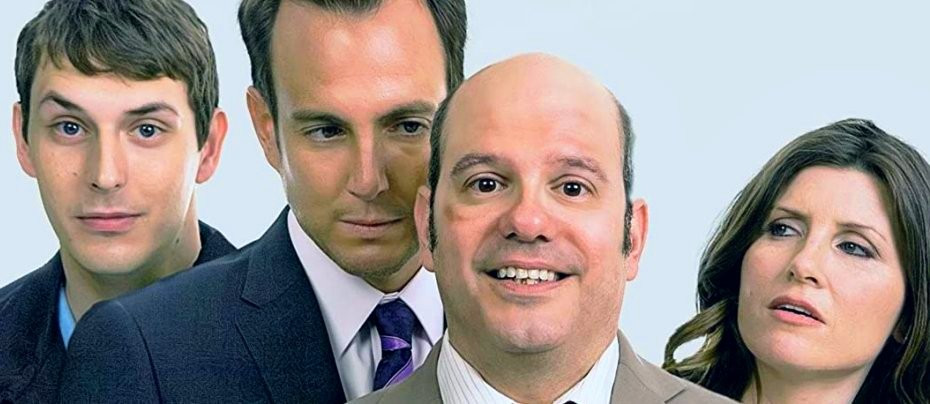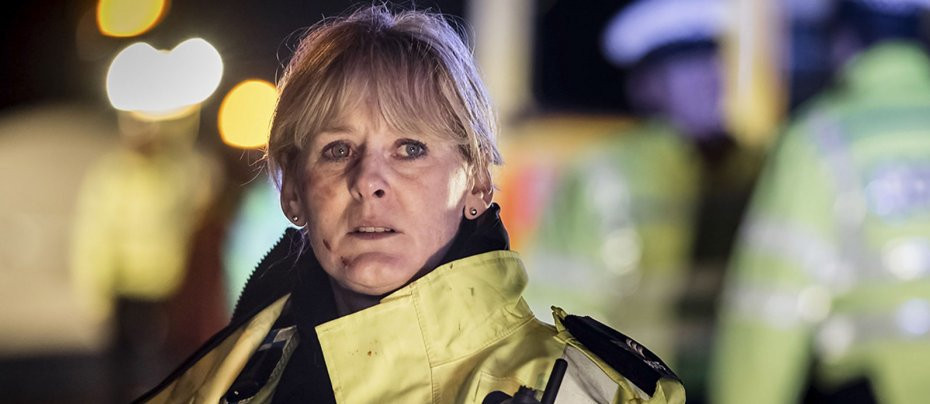
W1A
2014 - United KingdomReview: John Winterson Richards
Anyone living in Britain who takes television seriously probably has a love-hate relationship with the BBC. On the one hand, it is highly likely that it has produced some of their all time favourite programmes, as well as a disproportionate number of programmes that are generally held to be among the best and most influential in television history, not only nationally but globally. I, Claudius, Dad's Army, Edge of Darkness, Natural World, Monty Python, Lord Clark's Civilisation, The Goodies, Horizon, Yes, Minister - well, each of us can make up our own Roll of Honour.
At the same time, the BBC has also produced a great deal of rubbish, and, by definition, the ratio of rubbish to excellence is very high. Normally, this would not matter. After all, if you think a particular programme is rubbish, no one is forcing you to watch it. However, "because of the unique way the BBC is funded" - to quote an old advertising campaign for the BBC, shown on BBC channels that were supposed to be free of advertising "because of the unique way the BBC is funded" - we still have to pay for the rubbish even if we choose not to watch it.
The licence fee is a tax on watching any terrestrial television channel in the UK. It is paid to the BBC even by those who do not watch it. As a result, the BBC is held to a higher standard than a purely commercial television network in terms of quality, impartiality, and openness to public scrutiny. Put simply, people have more of a right to complain about the BBC - and they do.

In this context, the satirical comedy W1A is provides plenty of fuel for both hatred and love of the BBC. Many of the Corporation's biggest shortcomings are exposed and mocked ruthlessly - its chaotic management structure, its vapid popular programming, its excessive reliance on questionable "celebrity," its meaningless jargon, its incestuous appointments, its exclusively metropolitan attitudes, its Byzantine internal politics, its total subservience to so called "political correctness," and its constant focus on distinctly middle aged notions of modernity.
The show within the show, 'Britain's Tastiest Village,' is fictional but one can easily imagine someone in the Beeb seeing the title and thinking "Actually, that might work."
Yet, at the same time, it is hard not to love the BBC for having the courage and the sense of humour to laugh at itself - because W1A was produced and broadcast by the BBC.
To be honest, one rather suspects that the Corporation's management did not really know what they were going to get when they commissioned the show. They might have been a bit more cautious if they did. As it was, they may have felt in the end that they had no choice but to join in the laugh and pretend they were in on the joke all along.
For W1A cuts deep, and if it exaggerates for comic effect, it has an unerring eye for the BBC's weak points. Even some of the absurd bits have an air of credibility about them, suggesting "This did not happen but it might have done."
The show started life as a follow up to the similar satire on the then recent London Olympics, Twenty Twelve. However, the satire in that case had been blunted by the way that it was not really aimed at a specific organisation but at modern management in general - and also by the fact that the Olympics turned out to be an unexpected success. There was therefore a need to find a new object of satire that was an ongoing enterprise unlikely to resolve all its problems in the near future. It was not necessary to look far.
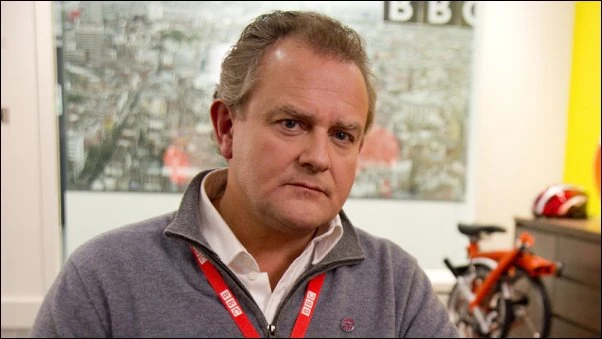
The same mock documentary or "mockumentary" format was adopted, with David Tennant again providing an immaculate commentary. Two of the best characters were also bought across from Twenty Twelve, Ian Fletcher (Hugh Bonneville) and Siobhan Sharpe (Jessica Hynes), the latter accompanied by her personal entourage of devoted groupies (Joel Fry, Sara Pascoe, and Alex Beckett).
Bonneville's Fletcher is still the epitome of frustrated decency, conscientious about trying to do what is supposed to be right thing even when he does not really understand it, while Siobhan is the complete opposite, a carelessly inconsiderate butterfly who nevertheless seems completely at home in her environment. While Bonneville plays it absolutely straight, the brief instant of horror when Fletcher finds out he will be working with her again is a perfect comic moment.

Most of the new characters follow his example in playing comedy like drama. The best is Sarah Parish's Anna Rampton, apparently a powerful, self possessed, battle hardened veteran of corporate warfare. It gradually becomes apparent that behind the facade is a vulnerable woman desperate to hide her lack of intellectual and emotional depth. A frightening person is revealed as very frightened - and becomes surprisingly sympathetic. It is a first class dramatic performance by a first class dramatic actress.
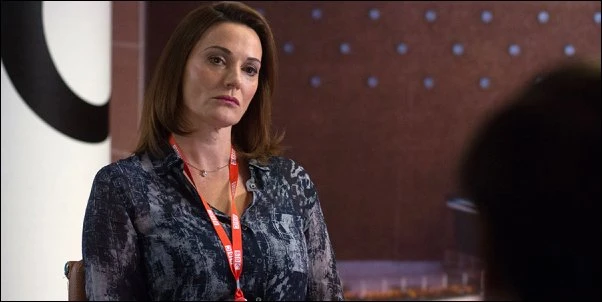
Simon Harwood, played by Jason Watkins, is an even more successful product of the BBC's internal politics. A smooth diplomat, his precise position in the Corporation hierarchy is left deliberately obscure: he defers to Fletcher, but seems to have a much better idea of what is going on. He keeps mentioning casual conversations with "Tony" - the BBC's real life Director General, Lord Hall - which, like the ambiguous poems written by ancient Emperors in the Orient, are not exactly direct commands but are obviously intended to be treated as such. He gives the impression that he is the man actually running the whole thing - if anyone is.
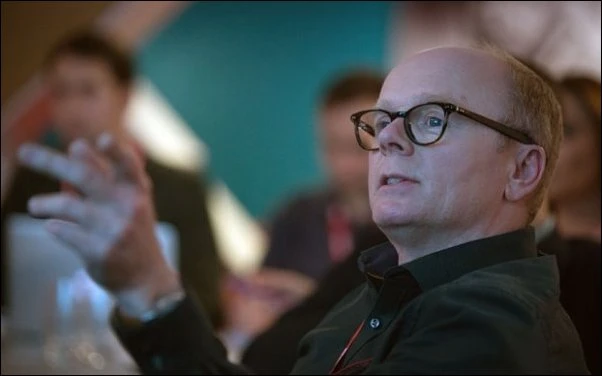
Watkins is an actor to watch, in every sense. He has a particular gift for the subtle projection of power - particularly well showcased here and as the manipulative vampire Herrick in Being Human. Given the right script, he has the potential to be up there with Sir Nigel Hawthorne and Ian Richardson.
Monica Dolan is great fun as possibly the only other person who has any real grasp of the situation, a relentlessly humourless Welsh communications officer who prefaces her dour interventions with "I don't mean to be funny but..."
Dolan has the Welsh manner and pattern of speech down so exactly that it is a surprise to discover that she is from the North of England.

The show gives Hugh Skinner, as a clueless but connected intern, an early run at the "Nice But Dim" upper class twit persona that he subsequently put to such good use in The Windsors.
As is to be expected in a series about the BBC, there are a great many "celebrity" cameos - or at least cameos from people the BBC ranks as celebrities. Even Lord Hall, the Director General - "Tony" himself - turns up, following the example of his fellow peer Lord Coe in Twenty Twelve, to show what a good sport he is. Harwood makes sure he is close by when he appears.

The meaningless job titles which were an amusing side joke in Twenty Twelve take centre stage in W1A - because the BBC really does have a reputation for them. So we have a '"Director of Better" (Rampton), a "Director of Strategic Governance" (Harwood), a "Head of Values" (Fletcher), a "Head of Output," a "Head of Inclusivity," and so on. Even 'Brand Consultant" Siobhan's PR posse are given silly titles of their own like "Ideation Architect" and "Viral Concept Designer."

The trendy idea of "hot desking" - which, at the time of writing, will hopefully prove a rare example of an unlamented casualty of coronavirus - is attacked mercilessly and rightly so. In the BBC, it is apparently "hot officing." Ugh! Another modern innovation, one that sounds good in theory but that rarely works out well in practice, is the integrated computer system. In W1A - as so often in real life - the attempt to synchronise everything to make it more convenient for everyone ends up making the simplest tasks needlessly complicated and therefore more open to error. There are moments when viewers with experience of such systems might wonder if they are watching a satire or a documentary.
Indeed, the great strength of W1A is that it maintains the documentary format throughout with a strict discipline. It never abandons it temporarily in search of cheap laughs. While some characters, like Siobhan and her crew, are unconsciously comic, most take themselves very seriously.
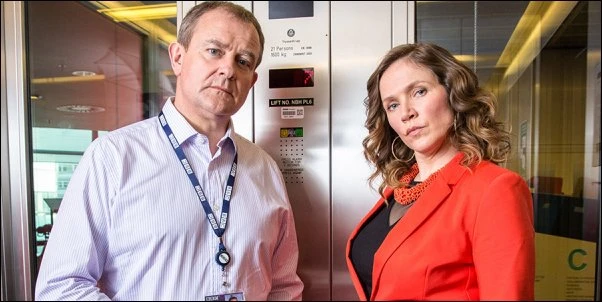
It looks as if the budgets were considerably higher than they were for Twenty Twelve. If so, the BBC got its money's worth with a slick, well written, well played, and well paced comedy that bears comparison with some of the Beeb's great classics.
If it gave a lot of ammunition to those who would like to see the licence fee, and possibly the BBC itself, abolished, it was also a reminder of what the Corporation does well. Overall, it is one of the best British comedies in recent years.
Seen this show? How do you rate it?
Seen this show? How do you rate it?
Published on May 14th, 2020. Written by John Winterson Richards for Television Heaven.


